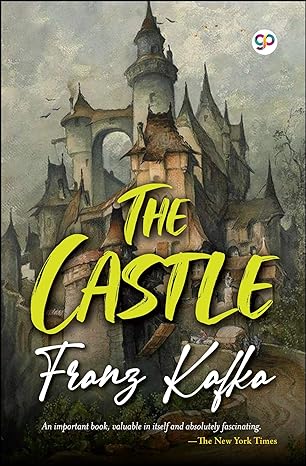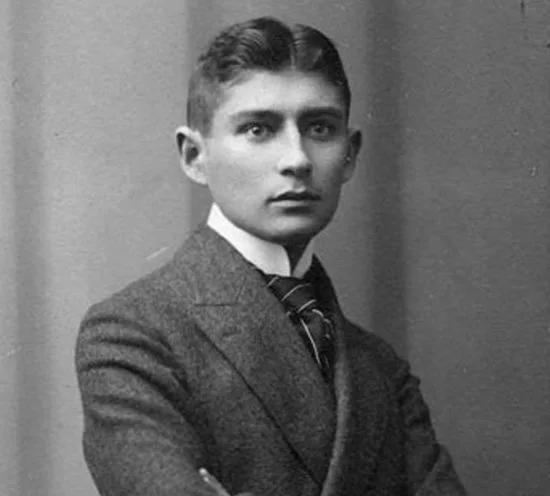
Published in Germany in 1926, Franz Kafka’s “The Castle” (Das Schloss) faced challenges after the author’s death in 1924.
Despite Kafka’s wish that his books not be published, his friend Max Brod disregarded this. Initially, “The Castle” struggled with poor sales, and Nazi efforts to ban works by German Jews, including Kafka, limited its availability. Schocken Verlag, a Jewish publisher, was allowed to continue publishing Jewish works under the condition that they were exclusively sold to Jews.
Today, Kafka is esteemed as one of the prominent figures in 20th-century literature, known particularly for his acclaimed works such as “The Trial”, “Metamorphosis”, and “The Castle”.
In “The Castle,” the narrative centers around a character known simply as “K”. “K” has been hired to survey Count West’s estate in a quaint village with a hill-castle hosting government office.
As K progresses through the plot, he discovers that his task is more complex and challenging than initially perceived. What should be routine becomes a frustrating journey, revealing his struggle to prove his role as a surveyor.
The plot
The story line begins with the protagonist, K., arriving in a village with the intention of claiming a position as a land surveyor. Initially, he is denied a room at the local inn. Eventually, he’s granted one when he claims a summon from the castle. Seeking permission to stay in the village, K. encounters suspicion and unwelcoming locals.
A note from the castle directs K. to speak with the mayor, but confusion arises. The note seems to acknowledge K.’s presence, but the mix-up becomes apparent when the mayor reveals that K. was summoned to the village by mistake. Despite the error, K. reluctantly accepts the role of the village school janitor and later marries Frieda. The congratulatory note from the castle (although, it appears to commend him for his work) adds another layer of uncertainty.
Moving further, K. starts residing in the school with Frieda and his assistants. Very soon, a sense of distrust and tension starts emerging out. The discovery of Frieda’s affair adds complexity to K.’s relationships. The revelation of infidelity typically brings emotional turmoil and a sense of betrayal, creating a rift between K. and Frieda.
It’s not just about their relationship – it also reflects the disorder in the castle’s bureaucratic system. This adds more depth to the story, making it more intricate and uncertain.
Meanwhile, the castle, admired by villagers, unravels administrative chaos, indicating that things are not as orderly and efficient as the villagers believe.
This contrast between the castle’s esteemed reputation and the actual disorder within it highlights a significant disparity, showcasing the theme of illusion and reality in the narrative. The discrepancy adds complication to the story, revealing the hidden complexities within the seemingly prestigious castle.
In the incomplete novel’s conclusion, K. finds himself in a favorable position with the castle. He is offered a new place to stay, indicating that the castle’s authorities, despite the earlier confusion and administrative chaos, now show a positive inclination toward K.
The novel concludes with this open-ended scenario, leaving readers to wonder about K.’s future in the castle and the nature of his relationship with its enigmatic authorities.
This unresolved ending adds to the overall ambiguity and existential themes characteristic of Franz Kafka’s works, inviting interpretation and speculation about K.’s fate.

Takeaway
In the book, K, grapples with a profound sense of identity that is intricately tied to his association with the mysterious castle. This castle, looms as a powerful and enigmatic force over K and others. Its towering presence could symbolize authority, mystery, and a pervasive influence over the lives of the characters.
Secondly, the castle’s authority and the tasks assigned to K shape his purpose and give structure to his life. Since, his self-worth and identity are deeply entwined with his perceived role in the service of the castle.
Since, we are talking about one of Kafka’s works, there has to be an existential tone. His writing often delves into the existential condition, exploring themes of absurdity, alienation, the search for meaning, and the struggle of individuals within oppressive and bureaucratic systems.
K’s quest to navigate the bureaucratic complexities of the castle reflects broader existential themes.
The castle, as a symbol, represents the inscrutable forces that shape human existence. K’s struggle to understand his place in this system mirrors the existential dilemma of individuals grappling with the meaning and purpose of their lives.
Honestly, I feel like the story doesn’t need a clear ending. Regardless of how the story concludes, the impression is that the outcome for the main character would not be positive. These books are not like regular stories. In fact, they serve as Kafka’s means of expressing his views on the world and his understanding of how the world operates.
If you’re into books that let you wander around and see things from different angles, Kafka’s stuff is right up your alley. His stories are like open roads with lots of possible detours, and every time you dive into one, it’s like finding a new path to explore. It’s not just reading – it’s a trip of uncovering and thinking.
If you’re keen on delving into this piece, you’re in for a treat – it’s in the public domain and accessible for free on Libcom.org. Feel free to give it a shot!



